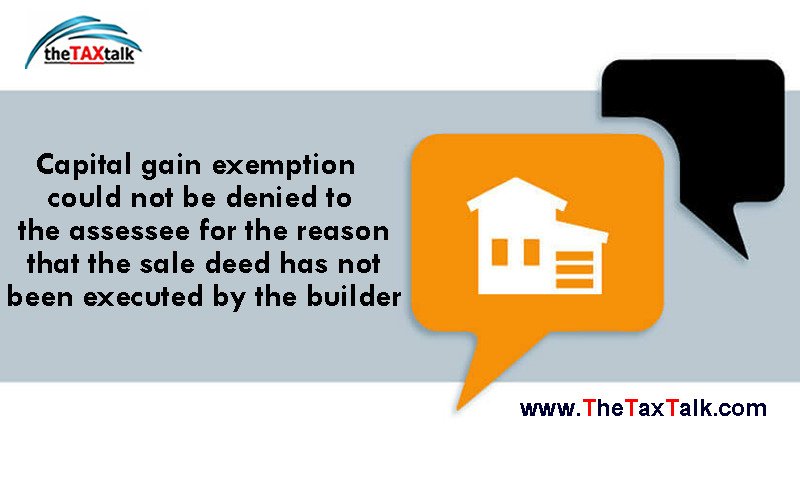![]()
Capital gain exemption could not be denied to the assessee for the reason that the sale deed has not been executed by the builder
Delhi High Court in the case of Commissioner Of Income-Tax vs R.L. has held that the capital gain exemption could not be denied to the assessee for the reason that the sale deed has not been executed by the builder. It has held as under:
“We may note that realising the practical difficulty faced by the assessees in such situations, the Central Board of Direct Taxes issued Circular No. 471 (see [1986] 162 ITR (St.) 41), dated October 15, 1986, clarifying that when the DDA issues the allotment letter to an allottee under its self-financing scheme, on payment of the first instalment of the cost of construction, the allottee gets title to the property and such allotment should be treated as cost of construction for the purpose of capital gains. On the same analogy, the assessee having been allotted the flat ; he having paid a substantial amount towards its cost within the stipulated period of one year, he cannot be denied the benefit of the said Section because the flat purchased by him had come into his full domain within the period of one year, though the sale deed in his favour was registered subsequently.”
The copy of the order is as under:
Delhi High Court
Commissioner Of Income-Tax vs R.L. Sood on 24 September, 1999
Equivalent citations: 2000 245 ITR 727 Delhi
Bench: A Kumar, D Jain
JUDGMENT
-
By this petition under Section 256(2)of the Income-tax Act, 1961 (for short “the Act”), pertaining to the assessment year 1982-83, the Revenue seeks a direction to the Income-tax Appellate Tribunal to state the case and refer the following question for the opinion of this court :
“Whether, on the facts and in the circumstances of the case, the Income-tax Appellate Tribunal is correct in law in holding that for the purpose of Section 54, the date of agreement to purchase should be taken as the date of purchase and the date of registration of sale deed for purchase is not relevant ?”
The assessee was the owner of a residential house which he sold on September 22, 1981, for a total consideration of Rs. 2,75,000, On September 25, 1981, he entered into an agreement for purchase of a residential flat and by September, 1982, paid a sum of Rs. 2,39,850 to the builder of the said flat. The actual possession was delivered to the assessee on February 17, 1985, and the sale deed in his favour was registered on February 26, 1985.
-
During the course of assessment proceedings for the relevant assessment year, the Assessing Officer brought the difference between the sale price of the residential flat sold by the assessee and the cost of acquisition of the said house to tax as capital gains on the ground that the assessee had failed to satisfy the conditions laid down in Section 54(1)of the Act inasmuch as he had failed to purchase the flat within the stipulated period of one year. The assessee’s appeal to the Commissioner of Income-tax (Appeals) was unsuccessful.
-
The assessee took the matter in further appeal to the Tribunal, who took the view that the assessee having purchased the new flat within one year of the sale of his old residential house, the provisions of Section 54(1)of the Act stood satisfied and, therefore, no income by way of capital gains could be taxed in the hands of the assessee. The Revenue’s application under Section 256(1)of the Act having been dismissed by the Tribunal the present petition has been filed.
-
We have heard Mr. Sanjiv Khanna, learned senior standing counsel on behalf of the Revenue.
-
In our view, the Tribunal was justified in declining” to make a reference on the proposed question to this court. Admittedly, the assessee had paid a sum of Rs. 2,39,850 out of the total sale consideration of Rs. 2,75,000 for the purchase of the flat within the period of one year from the date of sale of his old residential house. Thus, on payment of a substantial amount in terms of the agreement of purchase dated September 25, 1981, i.e., within four days of the sale of his old property, the assessee acquired substantial domain over the new residential flat within the specified period of one year and complied with the requirements of Section 54of the Act. Merely because the builder failed to hand over possession of the flat to the assessee within the period of one year, the assessee cannot be denied the benefit of the said benevolent provision. This would not be in consonance with the spirit of Section 54of the Act.
-
We may note that realising the practical difficulty faced by the assessees in such situations, the Central Board of Direct Taxes issued Circular No. 471 (see [1986] 162 ITR (St.) 41), dated October 15, 1986, clarifying that when the DDA issues the allotment letter to an allottee under its self-financing scheme, on payment of the first instalment of the cost of construction, the allottee gets title to the property and such allotment should be treated as cost of construction for the purpose of capital gains. On the same analogy, the assessee having been allotted the flat ; he having paid a substantial amount towards its cost within the stipulated period of one year, he cannot be denied the benefit of the said Section because the flat purchased by him had come into his full domain within the period of one year, though the sale deed in his favour was registered subsequently.
-
In the light of the said circular and keeping in view the spirit of Section 54of the Act, we decline the request of the Revenue to call for a reference on the proposed question.
-
Consequently, the petition is dismissed.


